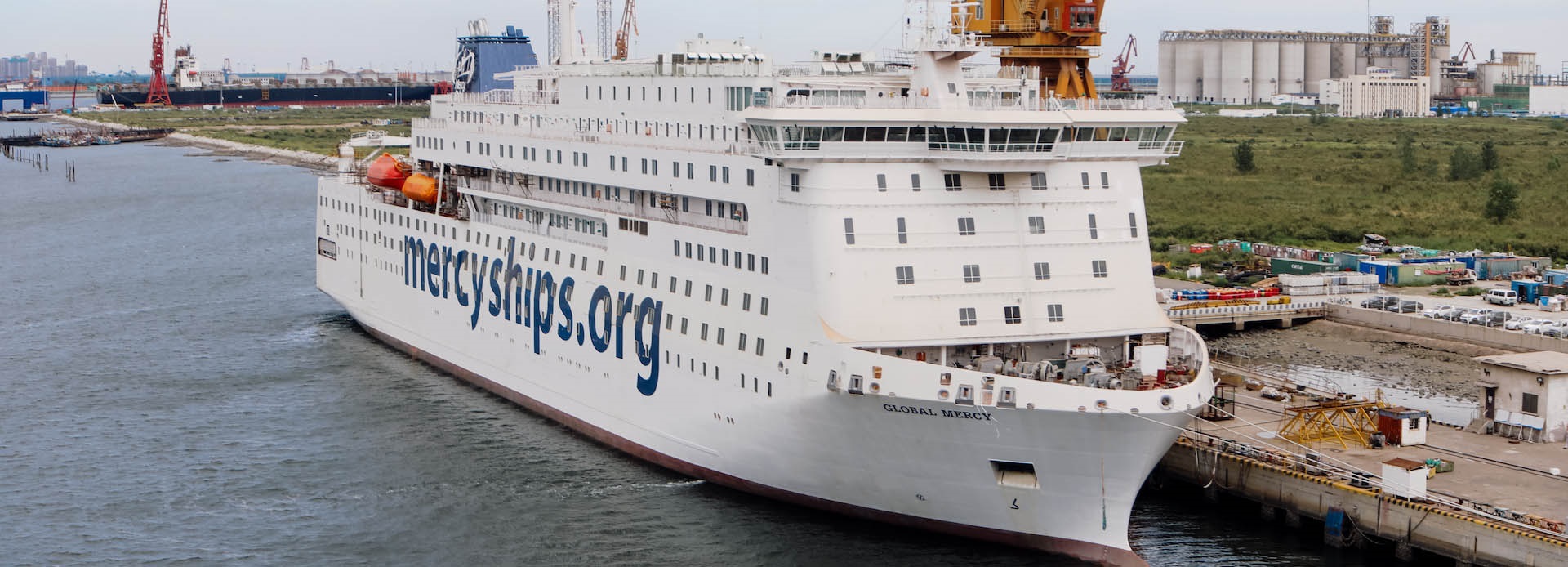

Wärtsilä engines will power the new Global Mercy hospital ship, allowing Mercy Ships to expand its humanitarian mission.
The ongoing Covid-19 pandemic has brought healthcare concerns to the forefront of global discussion, but for people living in poverty around the world, obtaining basic health care always has been a struggle. The international charity Mercy Ships has been
working to alleviate that burden since 1978.
Mercy Ships focuses on improving health care and health infrastructure for some of the world’s poorest people. Over the past 40 years, the organization has provided more than 100,000 surgeries to people living in poverty, primarily along the coast of Africa. In addition to performing operations, Mercy Ships sponsors community health programs and education as well as palliative care.
Mercy ships is now taking an important step in expanding its mission with a new vessel, the Global Mercy. The ship will more than double Mercy Ships’ annual medical and training capacity, and it will be powered by four Wärtsilä 32 engines. Wärtsilä has partnered with Mercy Ships to provide the engines along with a five-year agreement for maintenance services.
“We thought this would be the perfect way to live our purpose and do something good for society with our own know-how,” says Atte Palomäki, Executive Vice President, Communications, Branding & Marketing, Wärtsilä.
“It’s a perfect partnership because it’s not just about us funding someone to do their work, but more importantly our technology and expertise enables Mercy Ships to do their work in the best possible way. This way, we are engaged
hands-on.”
One of a kind
The Global Mercy will be Mercy Ships’ first custom-designed hospital ship. All of the charity’s previous vessels were converted from different types of vessels, including cruise ships and tankers. Investing in this vessel gave Mercy Ships
an opportunity to create a one-of-a-kind ship perfectly fitted for its needs.
The challenges of a hospital ship are unique. In addition to offering space for patient consultation, surgical operations, and post-operative care, there are technical concerns. The ship must have guaranteed power and clean water. It must vibrate as little as possible. It must have optimal ventilation
The Wärtsilä 32 is known for its reliability and flexibility. While Its power-to-space ratios allow for it to be installed easily on a wide range of vessels. This aspect is important for the Global Mercy, since space onboard must be optimised to accommodate operating theatres and patient care facilities as well as living space for the more than 600 crew members. The Global Mercy will also feature classroom and simulator labs to train local medical professionals.
The Wärtsilä engines are double resilient mounted, and comply with the DNV VIBR vibration classification. This smooth running capability is of special importance for a hospital ship with onboard surgical operations taking place. Additionally, the Wärtsilä 32 is known is an extremely low maintenance engine that has the ability to go for long periods without maintenance. It can run on a wide range of currently available fuels, including ultra low sulphur fuel oil, and will be able to run on environmentally friendly fuels currently in development, making it future-proof.
A new way to enable sustainable societies
The partnership is also a unique opportunity for Wärtsilä. Palomäki says this is the first time the company has been involved with a humanitarian organisation providing medical services at large scale.
“Normally when one thinks about Wärtsilä’s positive impact on society, it is about reducing emissions and fuel consumption, and thus improving the environmental footprint of our customers, but this taking our societal commitment to a completely different level,” Palomäki says.
Even though the partnership represented something new for Wärtsilä, Palomäki says the decision to get involved with Mercy Ships was very easy.
“This fits in so neatly with our purpose of enabling sustainable societies with smart technology. It is really the core technology and know-how that we have at Wärtsilä that is making this hospital run smoothly and reliably in very poor and undeveloped areas where people lack basic hospital services. Therefore, this partnership has a very strong societal dimension,” Palomäki says. “I am really quite excited about what all the good this brings to the people and I really hope that our Wärtsilä colleagues will feel proud and motivated by all of this when they see the impact that Mercy Ships is having.”
Mercy Ships hopes that the Global Mercy will be able to serve patients for decades to come, and Wärtsilä will be an important part of that.
“It will be our people doing the service work to ensure that the technology runs uninterrupted and is always operational This way, in the years to come, we hope to be very much part of the Mercy Ships family, making all this possible,” Palomäki says.



